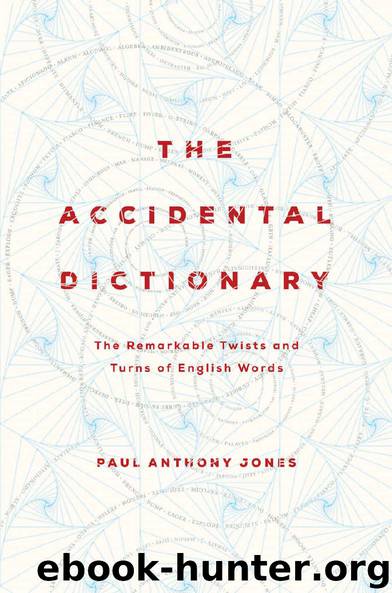The Accidental Dictionary: The Remarkable Twists and Turns of English Words by Paul Anthony Jones

Author:Paul Anthony Jones [Jones, Paul Anthony]
Language: eng
Format: epub, azw3
Publisher: Pegasus Books
Published: 2017-10-02T22:00:00+00:00
The letter J
was originally the letter I
In 1011, an English monk named Byrhtferð of Ramsey, based at Ramsey Abbey in Cambridgeshire, published a scientific manual called the Enchiridion (a Latin word for a handbook or manual). Alongside tables of weights and measures and essays on everything from rhetorical tropes to the age of the Earth, Byrhtferð wrote lengthy treatises on numerology and the symbolic significance of letters and numbers – and amidst all of that, he wrote out the earliest record of the English alphabet in history:
A B C D E F G H I K L M N O P Q R S T V X Y Z & 7 Þ Đ Æ
Clearly, things have changed. For one thing, Byrhtferð’s alphabet contains no fewer than twenty-nine letters, rather than twenty-six, thanks to the addition of the ancient runic letters wynn (), thorn (Þ) and eth (Đ), the Anglo-Saxon letter ash (Æ, a ligature combining A and E), and both the ampersand (&) and so-called Tironian ond (7) used to represent the word ‘and’. Despite totalling twenty-nine, however, there are some glaring omissions here too. There’s no W, which had yet to develop independently from the letter U. For that matter, there’s also no U, which had yet to be recognised as a separate letter from V And there’s no J, for good reason – J would not make its first appearance in the language for another five centuries, and even then it would not be the letter J that we recognise and use today.
J is the most recent addition to our alphabet. The origins and ancestors of many of our other letters stretch way back into antiquity (A, for instance, began life more than 3,500 years ago as an Ancient Egyptian hieroglyph representing an ox’s head). But J did not begin to emerge until the medieval period, around 700–800 years ago, when it developed from its alphabetical neighbour, I. To I, a tail or ‘swash’ was added to produce a curled symbol, J, whose purpose was merely to represent the last in a chain of Roman numeral Is – so 13 would once have been written xiij rather than xiii, 23 as xxiij not xxiii, and so on. Hence at its very earliest, the letter J was essentially just the letter I in disguise.
At that time, I could be used both as a vowel, as it still is today, and as a consonant, in which case it represented a sound known as the ‘voiced palatal approximant’ (in other words, the ‘y’ sound in words like you and yet). This use of I accounts for the likes of iust (instead of just) and iustice (instead of justice) cropping up in old documents and inscriptions, and explains why old religious texts and scriptures often talk of Jesus and Joseph, rather than ‘Jesus’ and ‘Joseph’. Its also why Indiana Jones misspells ‘Jehovah’ in The Last Crusade, But I digress.
All that began to change in the early sixteenth century, when along came a Renaissance poet and grammarian named Gian Giorgio Trissino.
Download
The Accidental Dictionary: The Remarkable Twists and Turns of English Words by Paul Anthony Jones.azw3
This site does not store any files on its server. We only index and link to content provided by other sites. Please contact the content providers to delete copyright contents if any and email us, we'll remove relevant links or contents immediately.
Cecilia; Or, Memoirs of an Heiress — Volume 1 by Fanny Burney(32549)
Cecilia; Or, Memoirs of an Heiress — Volume 2 by Fanny Burney(31948)
Cecilia; Or, Memoirs of an Heiress — Volume 3 by Fanny Burney(31932)
The Lost Art of Listening by Michael P. Nichols(7498)
Asking the Right Questions: A Guide to Critical Thinking by M. Neil Browne & Stuart M. Keeley(5764)
We Need to Talk by Celeste Headlee(5608)
On Writing A Memoir of the Craft by Stephen King(4937)
Dialogue by Robert McKee(4390)
Pre-Suasion: A Revolutionary Way to Influence and Persuade by Robert Cialdini(4224)
I Have Something to Say: Mastering the Art of Public Speaking in an Age of Disconnection by John Bowe(3884)
Elements of Style 2017 by Richard De A'Morelli(3343)
The Book of Human Emotions by Tiffany Watt Smith(3305)
Fluent Forever: How to Learn Any Language Fast and Never Forget It by Gabriel Wyner(3079)
Name Book, The: Over 10,000 Names--Their Meanings, Origins, and Spiritual Significance by Astoria Dorothy(2984)
Good Humor, Bad Taste: A Sociology of the Joke by Kuipers Giselinde(2945)
Why I Write by George Orwell(2945)
The Art Of Deception by Kevin Mitnick(2800)
The Grammaring Guide to English Grammar with Exercises by Péter Simon(2741)
Ancient Worlds by Michael Scott(2682)
